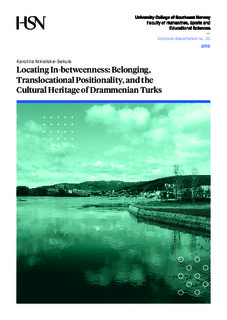| dc.contributor.author | Nikielska-Sekula, Karolina | |
| dc.coverage.spatial | Drammen | nb_NO |
| dc.date.accessioned | 2018-04-08T14:56:36Z | |
| dc.date.available | 2018-04-08T14:56:36Z | |
| dc.date.issued | 2018-04-20 | |
| dc.identifier.uri | http://hdl.handle.net/11250/2493127 | |
| dc.description.abstract | This thesis analyses belonging, translocational positionality, and the cultural heritage of people of Turkish descent inhabiting Drammen. In light of the settlement in this mid-sized Norwegian city, it discusses the ways Norwegian Turks use and create spaces and places in Drammen, influencing its landscape. The thesis explores respondents’ expressions of belonging on a median level, focusing on Turkish-run facilities in Drammen including shops, restaurants, cultural associations, and mosques. Furthermore, on the individual level, it focuses on the ways they conceptualise home in their narratives. The findings suggest that the idea of home comprises strong attachments to the social and physical spaces of Drammen, as well as an idealised longing to the ancestral homeland. However, the latter lacks the feeling of home. Furthermore, the thesis explores the complex construction of respondents’ identity. Employing a translocational positionality framework (Anthias, 2002, 2008, 2013), it discusses the everyday routines of Norwegian Turks, uncovering various identifications of respondents ranging from belonging to Turkishness and Islam to a strong identification with Norwegian society and the ‘spaces of foreigners’ attached to it. The ‘spaces of foreigners’ refer to respondents’ name for arenas within which people of minority background act. The author suggests that each identification of the respondents influences their experiences of other social roles and positions and their ways of exercising everyday practices. Therefore, only by approaching them as a whole can a complete picture of the complex identity of the respondents be obtained. Finally, the thesis investigates the engagement of Norwegian Turks with cultural heritage on the micro, mezzo, and macro levels. It exemplifies the incorporation of elements of Norwegian heritage into Turkish traditions and how participation in Norwegian heritage involves ethnic habits comprising food and feasting patterns that are assumed Turkish. The main argument attempted by this work is that the complex positionality of Norwegian Turks is localised in Drammen and influenced by the local circumstances of the city and the organisation of Norwegian society in general. Respondents have adapted their habits to the Norwegian reality, while they are rooted in Norway, even though their identification with the idea of being Turkish remains strong. | nb_NO |
| dc.language.iso | eng | nb_NO |
| dc.publisher | University College of Southeast Norway | nb_NO |
| dc.relation.ispartofseries | Doctoral dissertations at the University College of Southeast Norway;35 | |
| dc.rights | Navngivelse-Ikkekommersiell-DelPåSammeVilkår 4.0 Internasjonal | * |
| dc.rights.uri | http://creativecommons.org/licenses/by-nc-sa/4.0/deed.no | * |
| dc.subject | Norwegian Turks | nb_NO |
| dc.subject | belonging | nb_NO |
| dc.subject | identity | nb_NO |
| dc.subject | translocational positionality | nb_NO |
| dc.subject | cultural heritage | nb_NO |
| dc.subject | migration | nb_NO |
| dc.subject | urban studies | nb_NO |
| dc.title | Locating In-betweenness Belonging. Translocational Positionality, and the Cultural Heritage of Drammenian Turks | nb_NO |
| dc.type | Doctoral thesis | nb_NO |
| dc.description.version | publishedVersion | nb_NO |
| dc.rights.holder | © 2018 Karolina Nikielska-Sekula | nb_NO |
| dc.subject.nsi | VDP::Humanities: 000::The study of folklore, Ethnology: 100::Ethnology: 102 | nb_NO |
| dc.subject.nsi | VDP::Social science: 200::Social anthropology: 250 | nb_NO |

